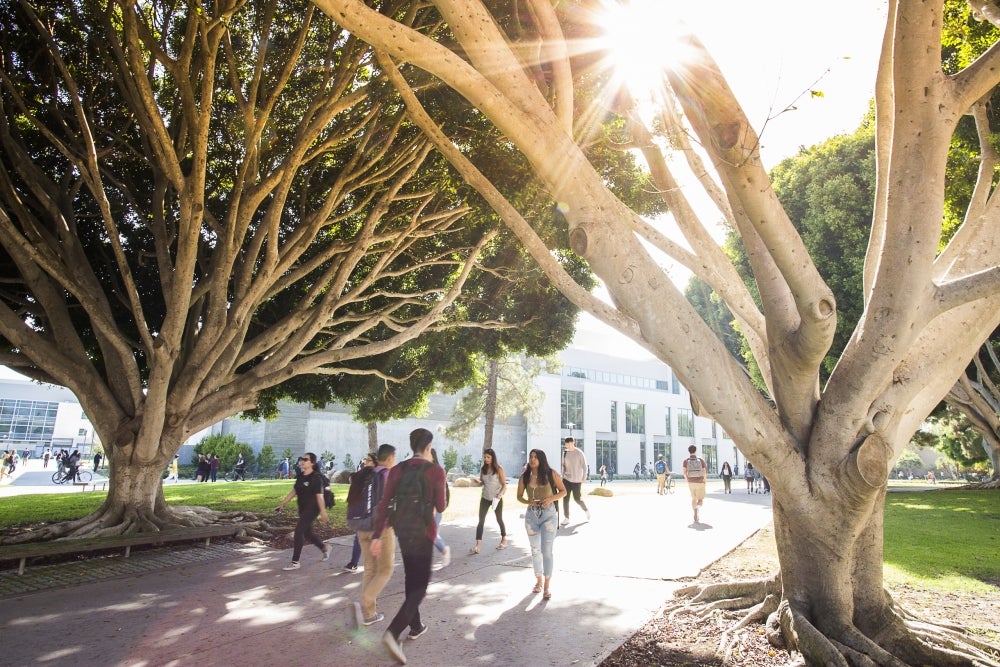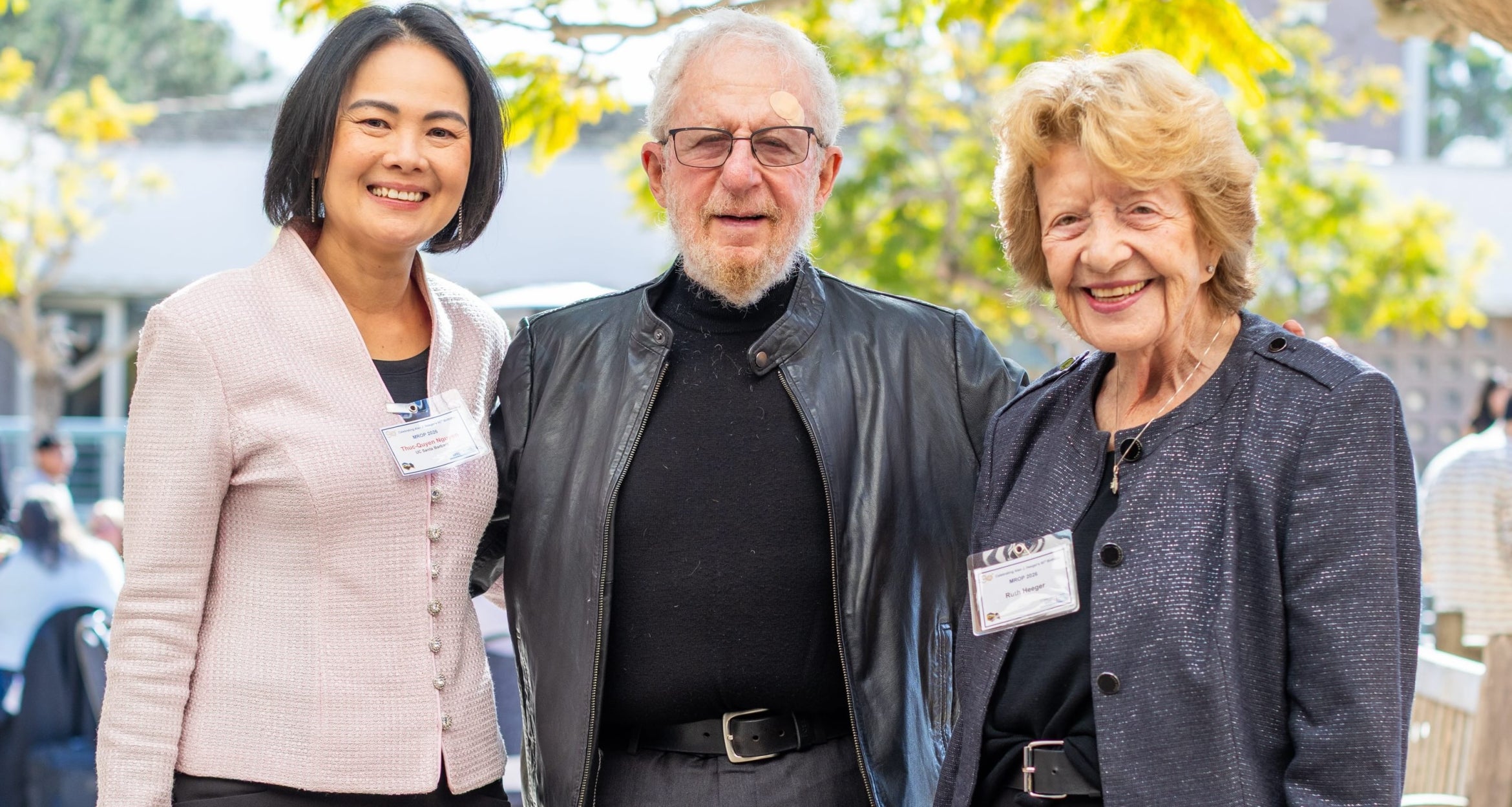
An Act of Caring
Paying special attention to the educational and personal needs of students impacted by the COVID-19 pandemic, UC Santa Barbara is boosting a wide swath of campus programs this summer and beyond thanks to the federal CARES (Coronavirus Aid, Relief, and Economic Security) Act.
The infusion of funds — more than $3.6 million is being allocated to the campus — comes from support reserved specifically for Minority Serving Institutions (MSI). In addition to its designation as an MSI, UC Santa Barbara is a Hispanic Serving Institution (HSI and an Asian American Native American Pacific Islander Serving Institution.
“During the unprecedented challenges of the past 16 months, federal CARES Act funding has been instrumental in helping our campus to continue to serve our students, and we are grateful for the additional support we have received because of our proud status as a Minority Serving Institution,” said Chancellor Henry T. Yang. “After collaborating with our campus colleagues on how to maximize the grant to have the greatest impact on our campus community and to serve those most in need, we have funneled the funding to programs that support and benefit our underrepresented and first-generation students as they pursue their academic goals this summer and throughout the next academic year. These programs will be especially important as our students return to campus, a moment we have all been waiting for, but one that also marks a significant transition that we will navigate together.”
In deciding where the grant money should be applied, a cooperative of multiple campus offices — Undergraduate Education, Graduate Division, Student Affairs, the Office of Diversity, Equity, and Inclusion, the Office of Research, and the Office of Finance and Resource Management — zeroed in on initiatives designed to support and benefit students whose presence has led to the university’s designation as an MSI, especially under-represented minorities, first-generation college students and those with financial need.
“Funding from the CARES Act provides crucial programmatic support for our underrepresented students,” said Belinda Robnett, vice chancellor for diversity, equity and inclusion. “In the fall, for example, our office is launching the graduate student program called ‘Thriving in the Academy.’ The COVID-19 pandemic has disproportionately impacted the Latinx, African-American and Native American communities. Our incoming cohort of graduate students belonging to these demographic groups will have experienced greater economic instability, higher rates of family deaths and increased emotional stress as compared to their counterparts. ‘Thriving in the Academy’ aims to increase both a feeling of belonging at UC Santa Barbara and the cultural capital of Latinx and other underrepresented graduate students.”
Achieving these short-term goals, Robnett continued, will contribute to the success of long-term objectives that include a lower attrition rate and a reduction in the time to degree as well as increases in the enrollment of Latinx/underrepresented minority doctoral graduate students, and increases in professional networks among Latinx/underrepresented minority graduate students and in research collaborations among HSI Latinx/underrepresented minority faculty and graduate students.
The programs and initiatives supported by CARES Act funding are designed to have a significant impact on the lives and academic success of UC Santa Barbara students.
“All students will benefit, but our focus has been ensuring student success for those who might have been impacted to a greater degree by COVID and its economic consequences,” said Executive Vice Chancellor David Marshall. “We have focused on programs and expenditures that can be implemented to comply with federal guidelines and deadlines, including both eligible allocations and expenditures that already occurred to respond to COVID and remote teaching conditions, and summer and fall programs that will help students as they return to campus.”
All of these expenditures benefit students, either through direct financial support by way of grants or stipends or through educational and support programs designed to ensure student success by better preparing students for their academic work and sustaining their progress and time to degree.
Among the major focus areas for the funds include summer programs; academic peer mentoring and advising; academic advising and mentoring; orientation and transition programming; graduate student research, training, and internship fellowships; graduate student remote teaching assistants; faculty development; and learning technologies.
“We also have focused on helping faculty redesign their curricula and pedagogy to improve teaching under these post-COVID circumstances, which then supports student success,” Marshall said.
The allocations include significant investment in mentoring programs and activities, which offer a double benefit of students receiving support to help other students. The Graduate Division, for instance, is seeing additional funds for mentorship via its Graduate Scholars Program, which provides support for graduate students from traditionally underrepresented populations. They also are offering summer stipends for graduate students whose research suffered during the pandemic, and supporting students to work as summer interns in the Office of the Vice Chancellor for Diversity, Equity, and Inclusion.
“In all of these ways, graduate students will receive direct support from CARES funds while furthering the mission of the university as a Minority Serving Institution,” said Interim Anne and Michael Towbes Graduate Dean Leila Rupp, also a distinguished professor of feminist studies. “We are very proud of our students, who rose to the challenges of teaching, mentoring and research during the pandemic. We are especially pleased that the new regulations allow us to support undocumented and international students.”
In the Office of Enrollment Services, funds are being directed to aid students with financial needs in two specific ways: to purchase and award Chromebooks and other devices; and to expand the Scholar Retention Program, which paves a path back to a UCSB degree for students who were academically dismissed or who have recently dropped out or stopped out.
Noted Michael Miller, associate vice chancellor of enrollment services, “This funding is allowing us to build a robust structure around some of the biggest gaps we’ve identified since the pandemic. We know those hit hardest financially by the pandemic are from underserved backgrounds and we are seeing the same thing. Being able to offer a needy student a laptop or offer them the renewed hope of earning a degree from a world-class institution like UCSB is a very powerful thing and it feels so good.”
Part of those same initiatives is the Office of Summer Sessions, which also is gaining additional support for its Undergraduate Mentorship Program by way of the new funding. In another collaborative endeavor with the financial aid office, they’re also providing a summer housing incentive grants of up to $1000 for aid-eligible students taking a full-time course load in summer, to help defray the cost of housing and other living expenses.
“One of our key goals is to ensure summer study is accessible and affordable for all students — this is actually written into our strategic plan,” said Leesa Beck, director of summer sessions. “Many students, particularly low-income students, need to work in the summer, which can make it difficult to take a full-time course load, even if they need the courses or units to stay on track academically. We typically exhaust the available funding well before all students’ financial aid awards are packaged, but this year, additional CARES funding will ensure that all qualified students receive this benefit.”
From transition and community-building initiatives such as Second Year Discovery seminars, the FirstGen Scholars Welcome, and the Transfer Student Success Conference, to faculty development by way of the RISE Institute aimed at re-thinking instruction, the Office of Undergraduate Education is serving as a hub to distribute funding to departments for a number of purposes.
“Not all of these are specifically within the Office of Undergraduate Education; however, they all will benefit undergraduate students,” said Linda Adler-Kassner, associate dean of undergraduate education. “The funds allow us to provide significant and much-needed support for students as we transition back to a meaningful in-person campus experience.”
A key focus within undergraduate education, she noted, is beefing up support for learning technologies, in addition to the provision of laptops and software for students in need.
“More than 40% of UCSB’s students come from economically disadvantaged backgrounds,” Adler-Kassner noted. “They have been disproportionately affected throughout the pandemic; as a result, the campus has seen egregious socioeconomic disparity in student access to technology needed to support remote learning and remote access to services. It is therefore even more critical that support be provided to students who cannot otherwise afford technologies to facilitate this participation that is so important post-COVID.”



